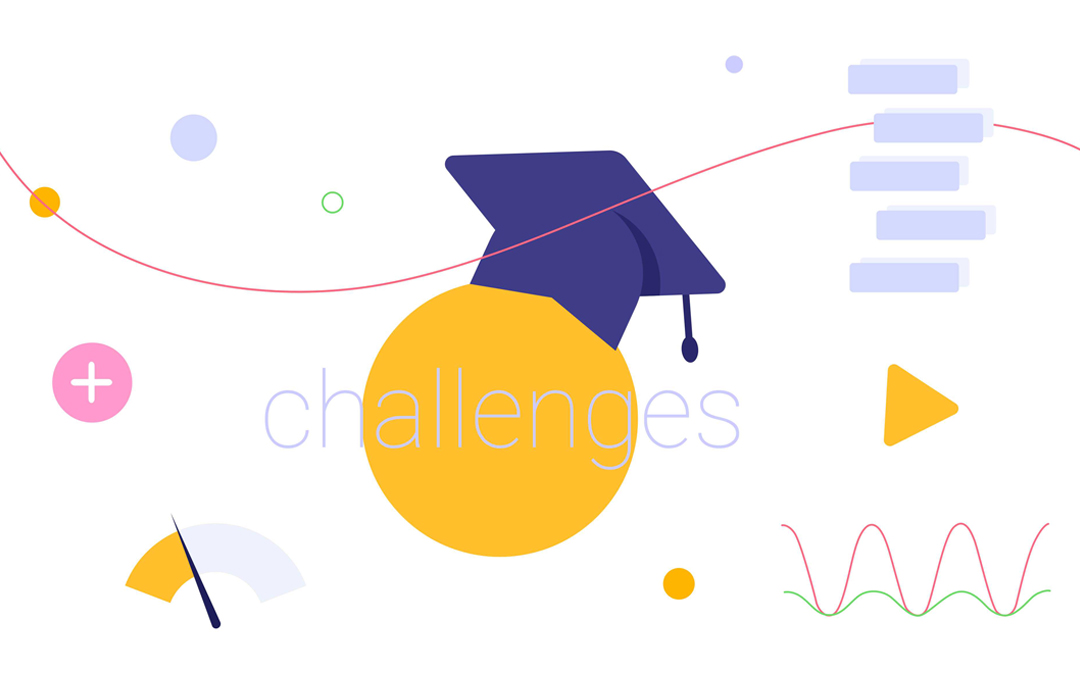Live and learn – this proverb has never been so relevant as in the 21st century. Your education isn’t over when you graduate from a university: being a highly skilled specialist and a healthy personality requires lifelong learning that in turn involves courses, training sessions, seminars, educational projects, etc. So, one of the main objectives of the educational sector is to be in line with the increasing demands for educational services. The importance of project management in education cannot be overestimated. No matter if it’s project management in higher education or managing projects at any other stage, it is meant to make the process of managing educational institutions’ projects seamless, efficient, and up-to-date. However, like in any other sphere of human activity, educational project management has its specific challenges. What are they, and how can they be handled? Let’s look into the matter.
What Is Project Management in Education and Why Do Institutions Need Project Management in Education Sector?
To be able to answer this question, let’s run back to one of the definitions of project management: it’s defined as “the process of leading the work of a team to achieve all project goals within the given constraints” [1]. These constraints are the project’s scope, budget, and time. So, effective project management involves successful implementation of a project under conditions of limited time and budget; efficient utilization of available resources, i.e. intelligent resource allocation, either human or material; managing risks and uncertainty; dealing with stakeholders; supporting the team, etc. Obviously, such an approach is widely used by various business and industrial organizations as a means of increasing productivity, managing challenges, and achieving strategic goals.
But what does it have to do with education? It seems that educational institutions are too far away from these business-related concepts. However, educational institutions require management like any other organizations. The essence of educational projects aimed at training students and forming their knowledge, abilities and skills in a certain area of expertise is completely different from business projects. However, often these are complex projects that require detailed planning, the ability to manage the team and available resources, etc. So, application of project management techniques with their adaptation to the context of educational institutions can be a powerful tool that will optimize their work, ensure effective collaboration, contribute to their efficiency, and result in a successful delivery of projects.
Challenges of Project Management in Education

Challenges of managing projects in education are explained by the specific character of the sphere: very often, a number of people working in educational institutions are far removed from the business environment, teamwork, or latest technology, which makes the process of managing academic projects much more difficult. This is why it’s so important to choose the right approach to project management to ensure the successful completion of projects. Let’s consider some challenging examples of project management in education. The issues listed below are among the most common project management challenges, at the same time, they are driven by specificity of the educational sphere.
Improper project planning in education
The backbone of a successful project is thorough planning. It involves setting clear goals, defining roles, estimating time and costs required for project implementation, planning resources and project processes. As for educational institutions, you can’t imagine their work without lots of planning, too: lesson plans, curricula, timetables, etc. However, planning a project is a different story, which requires certain knowledge as well as consistency, scrupulousness, and a clear idea of how the end result is to be achieved. People working at educational institutions (teachers, researchers, managerial staff) who are eager to start implementing their projects may neglect the phase of their detailed planning or not pay enough attention to it.
Inability to respond to changes quickly enough
There has been a lot of change in various aspects of education over the past few decades, but the most drastic change occurred in 2020 with the COVID-19 pandemic – it’s transition to online teaching and learning. This process was really painful both for students and educational institutions and was accompanied by a number of challenges – from technical issues to inability to master the new mode of teaching and learning quickly enough. As for managing projects in education, such an approach is relatively new to the educational sector, which requires acquisition of new skills (e.g. work in a team, a lot of communication related to the project, planning, etc.) by the managerial and teaching staff of an education institution.
Of course, we cannot but mention difficulties associated with digitalization. Educational sector has not been very quick in the adoption of new technology. Like in other industries and spheres, the COVID-19 pandemic has accelerated this process forcing teaching and managerial staff to master necessary tools as quickly as possible. However, a great number of workers weren’t ready for such an abrupt change towards a lot of online working. It can be still difficult for them to adapt, which, in particular, creates hindrances in the process of implementing various educational projects.
Lack of human resources for project management for education
This challenge is typical for a great number of companies and organizations, whether it be a fast-developing IT company or a state institution. As for educational institutions, the issue of insufficient staffing can be explained by the following factors:
- new professions and knowledge areas emerge faster that it’s possible to find a corresponding teacher who’d be ready to work at the educational institution, which gets complicated by time-consuming procedure of obtaining a license for corresponding educational services;
- the job of a teacher, especially at the educational institution, is not quite popular with young people, therefore as elderly staff members retire, it can be difficult to find substitutes for them as quickly as needed.
There also may be numerous reasons why staff members refuse or are not able to participate in educational projects.
Budget constraints
In a number of countries, the sphere of public education is associated with underfunding: domestic governments, being the main source of funding, don’t provide sufficient financial resources for educational needs. For this reason, educational institutions often lack enough financial and material resources for their projects, e.g. computers, equipment, software, etc. The situation has only got worse with the pandemic outbreak: according to the report, there is a significant slowdown in public education spending across the globe.
Changing educational project requirements
Educational standards and requirements are changing as time goes on, which together with digitalization trends or peculiarities of national educational systems can lead to changing requirements to the projects being managed. For example, ex-USSR countries are still in the process of transition to up-to-date international educational standards, and these changes can be introduced throughout the academic year. Another source of changing requirements is the inconsistency between the requirements of different departments of an educational institution. In all fairness, this challenge is not as common as in, for example, product development projects, but it shouldn’t be neglected anyway.
Difficult to measure success
When it comes to the educational projects that involve interaction of teachers and students, their final result may to some extent depend on students, which brings some uncertainty about the final outcome. For example, in projects that are aimed at gaining knowledge or forming certain abilities or skills in students, it may be rather difficult to assess the real result: the final assessment may not provide the truthful overview of the results obtained, and it’s difficult to trace whether the chosen approach was really effective over the long run. Besides, much depends on students and their efforts to master certain skills. These factors make it sometimes difficult to analyze the final outcomes of the implemented project and use this experience for future projects.
Other challenges in education project management
Managing projects in any area of human activity means dealing with people who are different in their behavior, thinking, past experience, etc. Therefore, other challenges of educational projects for the most part may be caused by human factor: for example, no project is immune to setting unrealistic expectations, establishing unrealistic deadlines, or miscommunication between project participants. Proper communication among project team members plays a crucial role in efficient project management, which is why it’s so important to address this and other complex challenges in educational project management.
How to Deal With PM Challenges in Education

Anyway, all of the above-mentioned key challenges don’t mean that you cannot succeed with your educational projects: these are quite achievable objectives. Applying a variety of project management techniques will provide a great help.
Start with detailed planning
You can’t overestimate the importance of planning as it’s an essential stage of the project lifecycle and allows you to some extent avoid further challenges like budget overrun, lack of resources, project delay, etc. If possible, involve other participants of the project into the planning process and establish clear goals, requirements, roles and expectations of all the parties involved.
Provide assistance to those who need it
Some of the employees may find it difficult to use certain software, be not accustomed to teamwork or struggle with other issues, so the best solution would be to provide them with assistance and support on their way to mastering new skills. Explain the benefits of project management and applying techniques and tools to those who doubt their usefulness.
Manage available resources
What makes project management efficient is the opportunity to deliver projects successfully by means of reasonable utilization of the available resources, even when there is a lack of them.
- Use resource management techniques (allocation of resources, leveling and scheduling).
- Prioritize the tasks, so that the team members will be focused on the tasks of the highest priority at a particular moment.
Control projects
Implement data-driven project management into your educational organization’s processes to get the desired project management outcomes. Project control is one of the most important aspects of project management together with analyzing resource performance in real time. Don’t check individual tasks of every resource, but keep track of key projects in your portfolio. In fact, project management software can provide great assistance in tracking project progress.
Establish procedure for changing requirements
Changing requirements may lead to scope creep, delays or even complete failure of a project. So every project participant should be aware that no changes can be made without following the established procedure involving the analysis of consequences that these changes will have on the project flow.
Manage available budget
- Sometimes, you may need to go back to the initial plan and analyze what has led to budget overrun and eliminate this factor.
- In other cases, it would be reasonable to engage more human resources: the educational context makes it possible to engage students, volunteers, or interns into the educational projects.
- Think of requesting more financial resources, if possible.
Final words
As we can see, despite the educational sector faces numerous challenges, most of them are quite manageable by means of numerous project management techniques. Of course, there are always some factors we cannot influence, or the ones that require more attention and thorough work, especially in the specific context of an educational institution. But despite possible challenges, the educational sector in general and educational institutions in particular can benefit from the application of project management and reach their organisational objectives faster, as implementation of project management provides them with an opportunity to be responsive to society’s increasing demands for high-quality educational services.


How is work organized in educational projects?
I need more guidance on this topic.